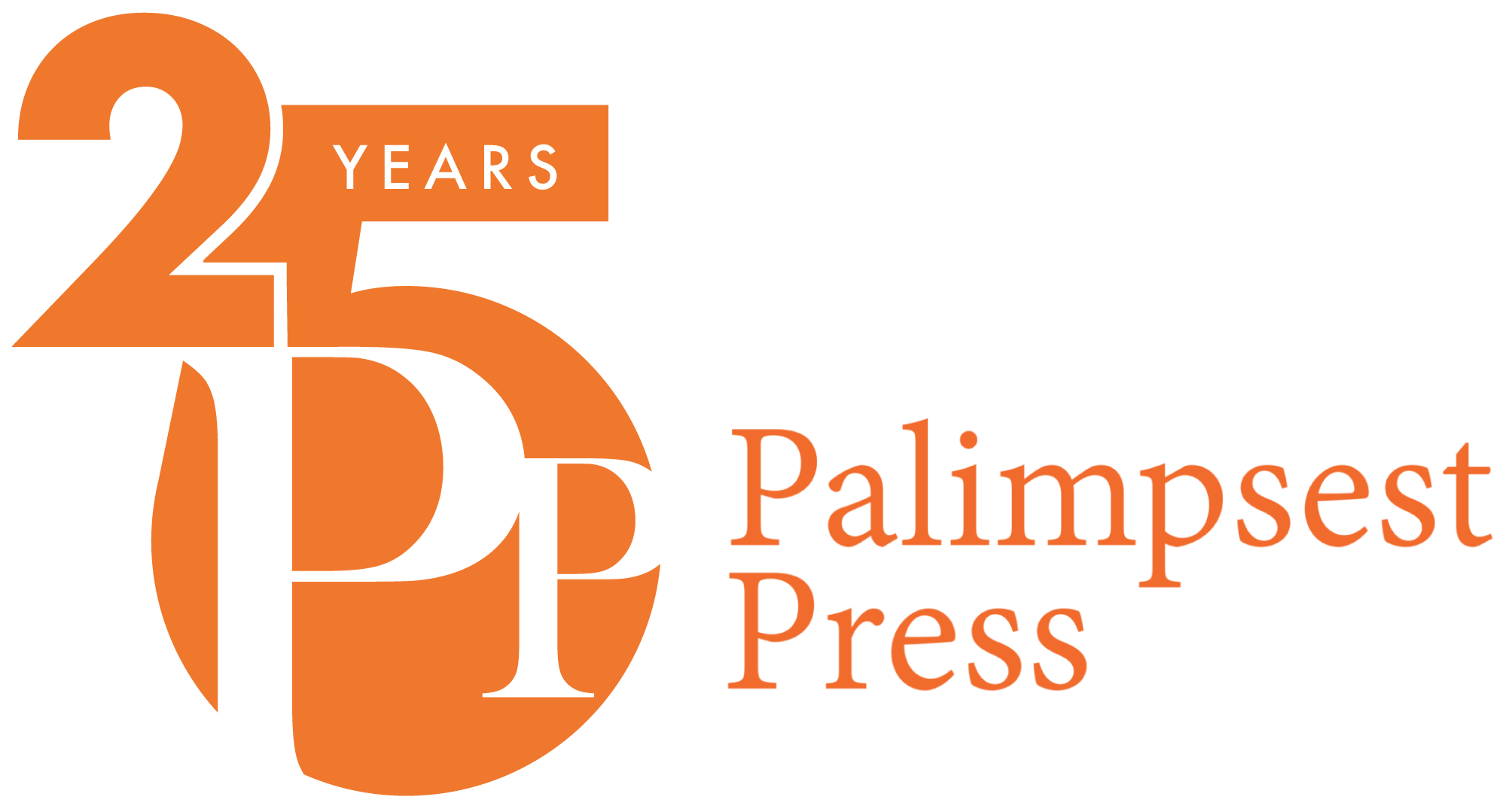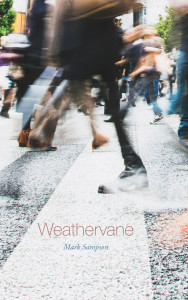Canadians famously love to talk about the weather. And what a winter we’ve had, ranging from snow storms to days that sprouted tulip shoots — only to freeze them back into the ground. Between tempests, it’s easy to find ourselves stuck in what should be transitional but often isn’t. These spaces are central to Mark Sampson’s aptly-titled Weathervane, a poetry collection that won’t necessarily show you the way the wind is blowing, but the ways multiple directions converge.
We caught up with Mark to talk about genre cross-training, prolificacy, and the bawdy. If you’re in Toronto on April 5, be sure to catch Weathervane‘s launch at Another Story (details below), and continue the conversation in person!
In Weathervane there are lots of everyday moments and activities readers will recognize — drinking beer, choosing a mattress, even donating blood — aligned with varying degrees of brutality, but also humour. Did you set out to tether worlds this way? When did the weathervane become apparent?
I certainly didn’t set out to tether these worlds in the beginning. I’ve always loved poetry for its elliptical, fragmented nature, the way its off-kilter narratives can provide a break from the more linear pathways of prose — and when I started out with these pieces, I was more than happy to just keep their ellipses, their fragmentations, intact. It wasn’t until about five years ago, when I started looking more closely at the poems I had been writing and publishing over the previous decade or so, that I began to see certain patterns emerging in the work, certain themes or ideas that connected or tethered these pieces together. I began to spot how best to group them together — poems about the elusive nature of the weather; poems about the consequences of action, poems about the consequences of inaction — and it was only then that I was ready to admit I had an actual book on my hands.
I find I’m always writing poetry about what I consider to be everyday moments or activities. One thing I learned early on in my journey with verse is that I’d better be able to see beauty, see poetry in mundane and common things, because so much of any given day can be filled with the mundane and the common, the daily drudgery of existence. I think it is poetry’s job to wake us up to what resides beneath all that, to re-energize us and show that we don’t necessarily need to lead an extraordinary life to see how extraordinary existence can be.
You play a great deal with language (particularly noticeable in poems like “Built Up”), and overall the speaker in the collection challenges altruism, human potential, and even the conceit of pathetic fallacy, saying of snow, “You brought this on;/ don’t waste a/ lifetime thinking otherwise.” Did you start writing these poems out of concepts?
I love playing with language, and sometimes it’s through a sheer act of playfulness with words that a concept for a poem might emerge. “Built Up” is a good example of that: one day I noticed how the seemingly innocuous phrase “built up” could carry both a positive and a negative connotation — everything from cholesterol in the arteries to the idea of sexual tension to stakes like one’s reputation and friendships — and I just wanted to stretch and pull that concept as much as I could to see what kind of poem might emerge.
The notion of pathetic fallacy plays a big role in my poetry, and it one of literature’s great tools. It can help deflect sentimentality (something I find myself susceptible to if I’m not careful), create vivid pictures in the mind’s eye, and, I think, teach us something about our emotional worlds by passing emotions on to things that can’t normally have them.
You’ve well-established yourself as a novelist and short story writer. What got you started writing poetry?
I began writing poetry seriously maybe fifteen years ago, while a graduate student in English and studying creative writing. Up until then I had been writing almost exclusively prose fiction and journalism, but I fell in love with verse’s malleability and mischievousness, the way a poem can mould itself to fit any shape it encounters. So I tried my hand at it, and, naturally, this resulted in a lot of bad poetry early on. Over those fifteen years, I had to throw out a lot of rancid, awful stuff — the very worst of my mental or emotional dribblings — before I could arrive at 80 pages I felt comfortable collecting into a book.
But I find that the poetry and the prose I write complement rather than detract from one another. Sometimes I’ll be looking over a paragraph in whatever novel I’m working on and think, Oh, that’s the poet in me coming out in the way I’ve cast that sentence. And sometimes if I find a poem is getting too “narrative-y” I remind myself that prose is always nearby if I want to satisfy that part of my creative brain.
While writing Weathervane, you also completed two novels. What’s it like working on two (or more!) genres and projects simultaneously? Has working in both forms changed how you think about them?
I love working in all the genres — all of them! Why, in the last week or so alone I have A) submitted a freshly completed novel to my editor, B) written a book review for Quill & Quire, C) retooled three new poems I’ve been working on, and D) gathered research materials for a new novel I’m hoping to start later this year. What can I say? I’m addicted to work.
But I should add that it took me a long time to come to terms with my desire for prolificacy. I think that, to a certain degree, writers — especially writers here in Canada — are conditioned to be somewhat costive in their output. I think literary people tend to equate the agony and effort needed to create a work of art with length of time. I felt like that for a long while, but I eventually decided this correlation is just not who I really am. I’ve most admired those writers who seem almost supernatural when it comes to their output — Atwood, Burgess, Amis, Oates, Updike — and it’s that prodigious effort that I try to emulate (even while keeping a 9 to 5 office job on top of everything else).
I’m certain not everyone feels this way, and I’m sure there are lots of arguments one could make against being so obsessed with productivity. But I don’t care. Hanging on our bedroom wall is a broadside of a Michael Crummey poem that my wife gave me in which the last line reads “You have less time than you think.” The truth of that line just socks me between the eyes, every time. I really do feel, especially now that I’m in my forties, an acute fear about whether I have enough years left to get all the work done I want to do. I don’t consider the literary life a torture. Most mornings I damn well leap out of bed, anxious to get at that writing desk.
Has writing and publishing Weathervane kickstarted any new poetry projects? Did you leave Weathervane feeling like you could head in new directions?
Absolutely. As I mentioned above, I’ve been working on a few new poems, and I’ve basically been going back and reacquainting myself with the canon of verse — everything from The Epic of Gilgamesh and Homer up through the centuries of English poetry — as a kind of self-imposed refresher course. One of the things I want to do in this new collection is try to bring more of the bawdy back to poetry. I did this a little bit in Weathervane, with poems like “North Korean Porn” and “Dressing in Layers,” but for the next book I want to make bawdiness more of an overarching focus. When you go back and reread canonical poetry on its own terms, one thing you notice is just how sensual, how desire-obsessed, how downright cheeky a lot of it can be. So I’m curious how much of that I can bring into my own verse, how much of the bawdy that a contemporary audience — and I would include myself as the author in that — can tolerate before it’s pushed too far. Hopefully it won’t take another fifteen years to pull this collection together.
Join Mark as he launches Weathervane in Toronto with fellow Palimpsest authors Shawna Lemay and John Nyman.
Launch Details
Tuesday, April 5
Another Story Bookshop — 315 Roncesvalles
7 p.m.
Books will be available for signing, and light refreshments will be served. If you can’t make the launch, order your copy of Weathervane!

